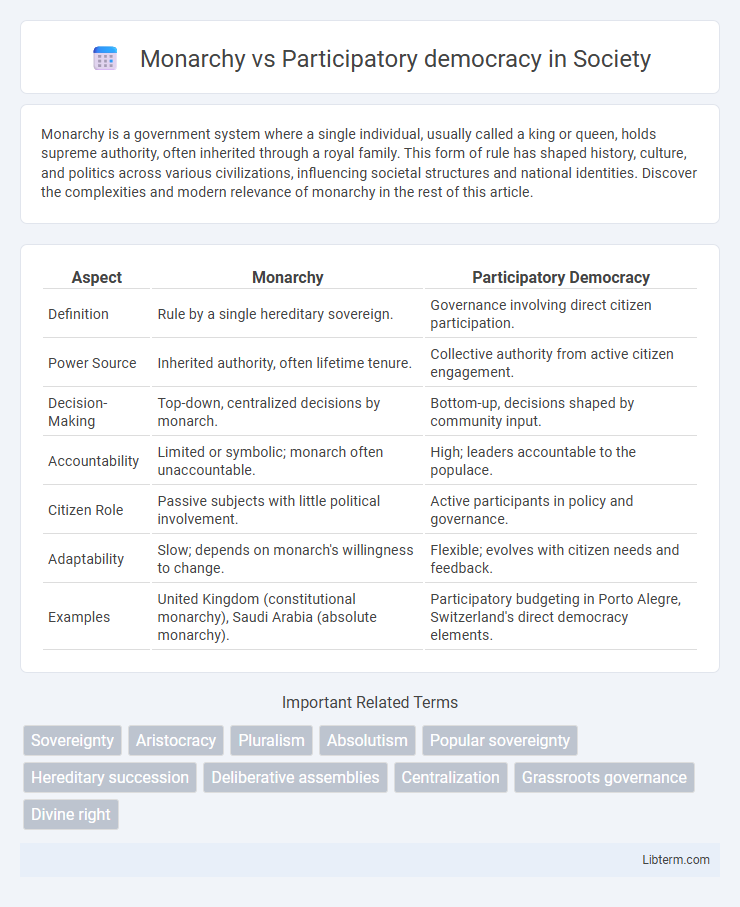Monarchy is a government system where a single individual, usually called a king or queen, holds supreme authority, often inherited through a royal family. This form of rule has shaped history, culture, and politics across various civilizations, influencing societal structures and national identities. Discover the complexities and modern relevance of monarchy in the rest of this article.
Table of Comparison
| Aspect | Monarchy | Participatory Democracy |
|---|---|---|
| Definition | Rule by a single hereditary sovereign. | Governance involving direct citizen participation. |
| Power Source | Inherited authority, often lifetime tenure. | Collective authority from active citizen engagement. |
| Decision-Making | Top-down, centralized decisions by monarch. | Bottom-up, decisions shaped by community input. |
| Accountability | Limited or symbolic; monarch often unaccountable. | High; leaders accountable to the populace. |
| Citizen Role | Passive subjects with little political involvement. | Active participants in policy and governance. |
| Adaptability | Slow; depends on monarch's willingness to change. | Flexible; evolves with citizen needs and feedback. |
| Examples | United Kingdom (constitutional monarchy), Saudi Arabia (absolute monarchy). | Participatory budgeting in Porto Alegre, Switzerland's direct democracy elements. |
Understanding Monarchy: Definition and Key Features
Monarchy is a form of government where a single ruler, often a king or queen, holds supreme authority, typically inherited through a royal family lineage. Key features include centralized power, lifelong tenure, and limited political pluralism, with decisions often made without broad public consultation. Monarchies can be absolute, where the monarch has unrestricted control, or constitutional, where their powers are limited by law or a representative body.
Participatory Democracy: Principles and Functions
Participatory democracy emphasizes direct involvement of citizens in decision-making processes, ensuring transparency, accountability, and community engagement. It functions by enabling individuals to deliberate on policies, influence legislative agendas, and collaborate in governance beyond just voting in elections. Core principles include inclusivity, equal representation, and empowerment of marginalized groups to achieve more responsive and equitable government outcomes.
Historical Evolution: Monarchies and Democracies
Monarchies have historically dominated political systems, with early civilizations like Ancient Egypt and Medieval Europe ruled by kings and queens whose power was often hereditary and centralized. Participatory democracy emerged more recently, gaining traction during the Enlightenment era, emphasizing citizen involvement and collective decision-making, exemplified by developments in Ancient Athens and modern democratic states. Over time, many monarchies transformed into constitutional forms, blending elements of both systems and paving the way for contemporary democratic governance.
Political Power Distribution: Centralization vs. Decentralization
Monarchy centralizes political power in the hands of a single ruler or a royal family, often resulting in a top-down governance structure with limited public input. Participatory democracy distributes political power more broadly among citizens, encouraging decentralized decision-making through direct involvement in policy and governance processes. This decentralization promotes transparency, accountability, and diverse representation in political institutions.
Citizen Involvement: Passive Subjects or Active Participants?
In a monarchy, citizens often hold passive roles with limited influence over political decisions, as authority is centralized under a sovereign ruler. Participatory democracy emphasizes active citizen involvement, encouraging individuals to engage directly in decision-making processes through voting, public discussions, and community initiatives. This active participation fosters accountability and ensures that governance reflects the diverse interests of the populace.
Decision-Making Processes: Authority vs. Collective Choice
Monarchy centralizes decision-making authority in a single ruler, enabling swift and often unilateral policy implementation based on inherited or absolute power. Participatory democracy distributes decision-making across a broad base of citizens, emphasizing collective choice through voting, deliberation, and consensus-building mechanisms that reflect diverse interests. The efficiency of monarchic authority contrasts with the inclusive but potentially slower processes of participatory democratic governance.
Stability and Adaptability: Comparing Political Longevity
Monarchy often provides greater political stability due to centralized authority and continuity of leadership, reducing frequent policy shifts and power struggles. Participatory democracy enhances adaptability by encouraging citizen involvement and responsiveness to social changes, fostering innovation and reform through diverse perspectives. The longevity of political systems depends on balancing the monarchy's durable governance with democracy's capacity for dynamic change and public engagement.
Social and Economic Impacts of Each System
Monarchy often centralizes wealth and power, leading to social stratification and limited economic mobility, while participatory democracy encourages wealth distribution through inclusive policymaking and public accountability. Economic growth in monarchies may benefit elite groups, whereas participatory democracy fosters broader participation in economic decisions that drive innovation and equitable social welfare. Socially, monarchies can suppress dissent and limit civic engagement, whereas participatory democracies promote social cohesion by empowering citizens to influence policies and resource allocation.
Modern Examples: Countries Practicing Monarchy and Participatory Democracy
Modern monarchies include the United Kingdom, Sweden, and Japan, where constitutional monarchs perform ceremonial roles while elected governments govern. Participatory democracy is exemplified by countries like Switzerland, which implements direct citizen voting on various governmental issues, enhancing public involvement in decision-making. These contrasting systems highlight differing degrees of citizen engagement and governmental power distribution in contemporary politics.
Future Prospects: Trends and Transformations in Governance
Monarchy, traditionally characterized by centralized power, faces increasing pressure to adapt through constitutional reforms or ceremonial roles to stay relevant in modern governance. Participatory democracy is advancing with digital platforms enabling broader citizen engagement and real-time policy feedback, enhancing transparency and accountability. Emerging trends indicate a hybrid governance model blending monarchic symbolism with participatory mechanisms may shape future political landscapes.
Monarchy Infographic

 libterm.com
libterm.com